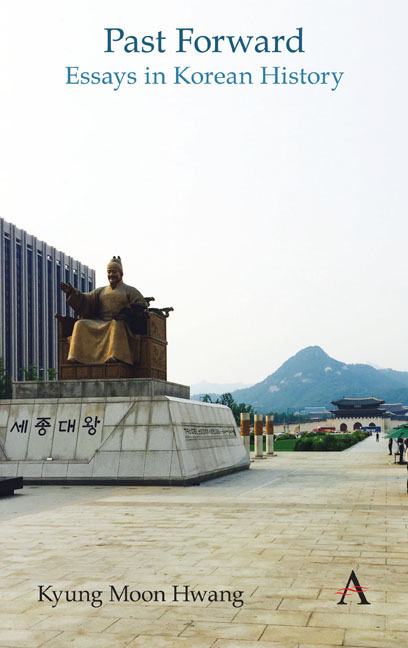Book contents
- Frontmatter
- Contents
- List of Figures
- Foreword
- Chronologies of Korean History
- Themes
- Acknowledgments
- Note on Romanization and Spelling
- Part I Circulating History
- Part II Durable Traditions
- Part III Ancient Remains
- Part IV Dynastic Depths
- Part V Modern Origins
- Part VI Challenges of Nationhood
- Part VII History Makers
- Part VIII External Presences
- Part IX Trials of Modernization
- Part X Gripped by the Past
- 70 Natural Disasters and the False Wisdom of the Past
- 71 Royal Dangers
- 72 North Korea's Alternative History
- 73 Origins of Korea's Political Corruption
- 74 Anti-Communism's Powerful Hold
- 75 Fraudulent Captains of the Sewol Ferry Disaster
- 76 Overcoming Past Hierarchies
- 77 Gripped by the Authoritarian Mindset
- 78 Ways of Living History
- Index
73 - Origins of Korea's Political Corruption
from Part X - Gripped by the Past
- Frontmatter
- Contents
- List of Figures
- Foreword
- Chronologies of Korean History
- Themes
- Acknowledgments
- Note on Romanization and Spelling
- Part I Circulating History
- Part II Durable Traditions
- Part III Ancient Remains
- Part IV Dynastic Depths
- Part V Modern Origins
- Part VI Challenges of Nationhood
- Part VII History Makers
- Part VIII External Presences
- Part IX Trials of Modernization
- Part X Gripped by the Past
- 70 Natural Disasters and the False Wisdom of the Past
- 71 Royal Dangers
- 72 North Korea's Alternative History
- 73 Origins of Korea's Political Corruption
- 74 Anti-Communism's Powerful Hold
- 75 Fraudulent Captains of the Sewol Ferry Disaster
- 76 Overcoming Past Hierarchies
- 77 Gripped by the Authoritarian Mindset
- 78 Ways of Living History
- Index
Summary
Every major election season in South Korea seems to bring forth a scramble among politicians to break away from, rearrange, and construct new alliances. This cycle of party formation and destruction has characterized South Korean politics since liberation from Japanese colonial rule in 1945.
What seems to get lost in all this is the idea of public service, that holding elected office is a duty, not a prize or instrument for personal gain. With government office comes the great responsibility to use political authority not for oneself, but for the greater good. Notwithstanding the chronic failure to live up to them, such ideals have been around for a very long time. They lay at the heart of Confucian political teachings that entered Korea more than a thousand years ago and drove political development thereafter.
So why has it been so difficult to realize these ideals in Korean political culture? Why do many South Korean political and government officials remain so prone to treating their offices as vehicles for self-aggrandizement or, even worse, as money-making ventures? In short, why is corruption still such a problem?
Despite over three decades as an electoral democracy and an even longer history of press monitoring of politics, South Korea still consistently ranks embarrassingly low in the periodic surveys of corruption around the world. Habits of paying people in power, from policemen to presidents, to gain access, attention and outcomes seem ingrained among South Koreans, as if they were born with this inclination. This cannot be true, of course, any more than it is for people living in other countries suffering from chronic corruption. And there seems no definitive answer to explain this behavior, aside from turning to Korean history to find possible origins.
We can begin with Confucianism itself, which values not only hierarchy in social relations but also reciprocity, the idea that one should repay kind treatment. This is in general a good thing, but in the political arena, as reformers observed hundreds of years ago, this can lead to officials expecting something in return for their decisions. And just as powerfully, it triggers the impulse to pay bribes, even irrespective of the official's wishes, knowing that the official will feel obligated to return the favor.
- Type
- Chapter
- Information
- Past ForwardEssays in Korean History, pp. 211 - 213Publisher: Anthem PressPrint publication year: 2019



